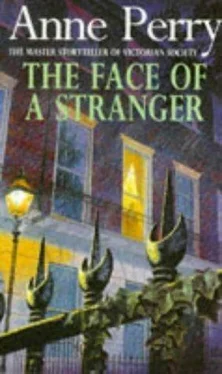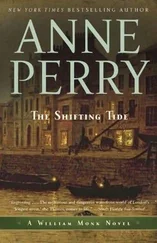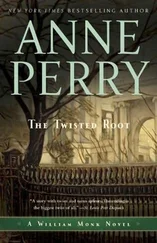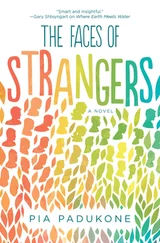Anne Perry - The Face of a Stranger
Здесь есть возможность читать онлайн «Anne Perry - The Face of a Stranger» весь текст электронной книги совершенно бесплатно (целиком полную версию без сокращений). В некоторых случаях можно слушать аудио, скачать через торрент в формате fb2 и присутствует краткое содержание. Жанр: Исторический детектив, на английском языке. Описание произведения, (предисловие) а так же отзывы посетителей доступны на портале библиотеки ЛибКат.
- Название:The Face of a Stranger
- Автор:
- Жанр:
- Год:неизвестен
- ISBN:нет данных
- Рейтинг книги:4 / 5. Голосов: 1
-
Избранное:Добавить в избранное
- Отзывы:
-
Ваша оценка:
- 80
- 1
- 2
- 3
- 4
- 5
The Face of a Stranger: краткое содержание, описание и аннотация
Предлагаем к чтению аннотацию, описание, краткое содержание или предисловие (зависит от того, что написал сам автор книги «The Face of a Stranger»). Если вы не нашли необходимую информацию о книге — напишите в комментариях, мы постараемся отыскать её.
The Face of a Stranger — читать онлайн бесплатно полную книгу (весь текст) целиком
Ниже представлен текст книги, разбитый по страницам. Система сохранения места последней прочитанной страницы, позволяет с удобством читать онлайн бесплатно книгу «The Face of a Stranger», без необходимости каждый раз заново искать на чём Вы остановились. Поставьте закладку, и сможете в любой момент перейти на страницу, на которой закончили чтение.
Интервал:
Закладка:
Evan had acquired a rapid education in the manners and morals of his financial betters, and now was feeling both bemused and disillusioned. He sat in the train staring out of the window, and Monk regarded him with a compassion not unmixed with humor. He knew the feeling, although he could not recall experiencing it himself. Was it possible he had never been so young? It was an unpleasant thought that he might always have been cynical, without that particular kind of innocence, even as a child.
Discovering himself step by step, as one might a stranger, was stretching his nerves further than he had been aware of until now. Sometimes he woke in the night, afraid of knowledge, feeling himself full of unknown shames and disappointments. The shapelessness of his doubt was worse than certainty would have been; even certainty of arrogance, indifference, or of having overridden justice for the sake of ambition.
But the more he pulled and struggled with it, the more stubbornly it resisted; it would come only thread by thread, without cohesion, a fragment at a time. Where had he learned his careful, precise diction? Who had taught him to move and to dress like a gentleman, to be so easy in his manners? Had he merely aped his betters over the years? Something very vague stirred in his mind, a feeling rather than a thought, that there had been someone he admired, someone who had taken time and trouble, a mentor-but no voice, nothing but an impression of working, practicing-and an ideal.
The people from whom they learned more about Joscelin Grey were the Dawlishes. Their house was in Primrose Hill, not far from the Zoological Gardens, and Monk and Evan went to visit them the day after returning from Shel-burne. They were admitted by a butler too well trained to show surprise, even at the sight of policemen on the front doorstep. Mrs. Dawlish received them in the morning room. She was a small, mild-featured woman with faded hazel eyes and brown hair which escaped its pins.
"Mr. Monk?" She queried his name because it obviously meant nothing to her.
Monk bowed very slightly.
"Yes ma'am; and Mr. Evan. If Mr. Evan might have your permission to speak to the servants and see if they can be of assistance?"
"I think it unlikely, Mr. Monk." The idea was obviously futile in her estimation. "But as long as he does not distract them from their duties, of course he may."
"Thank you, ma'am." Evan departed with alacrity, leaving Monk still standing.
"About poor Joscelin Grey?" Mrs. Dawlish was puzzled and a little nervous, but apparently not unwilling to help. "What can we tell you? It was a most terrible tragedy. We had not known him very long, you know."
"How long, Mrs. Dawlish?"
"About five weeks before he… died." She sat down and he was glad to follow suit. "I believe it cannot have been more."
"But you invited him to stay with you? Do you often do that, on such short acquaintance?"
She shook her head, another strand of hair came undone and she ignored it.
"No, no hardly ever. But of course he was Menard Grey's brother-" Her face was suddenly hurt, as if something had betrayed her inexplicably and without warning, wounding where she had believed herself safe. "And Jos-celin was so charming, so very natural," she went on. "And of course he also knew Edward, my eldest son, who was killed at Inkermann."
"I'm sorry."
Her face was very stiff, and for a moment he was afraid she would not be able to control herself. He spoke to cover the silence and her embarrassment.
"You said 'also.' Did Menard Grey know your son?"
"Oh yes," she said quietly. "They were close friends- for years." Her eyes filled with tears. "Since school."
"So you invited Joscelin Grey to Stay with you?" He did not wait for her to reply; she was beyond speech. "That's very natural." Then quite a new idea occurred to him with sudden, violent hope. Perhaps the murder was nothing to do with any current scandal, but a legacy from the war, something that had happened on the battlefield? It was possible. He should have thought of it before-they all should.
"Yes," she said very quietly, mastering herself again. "If he knew Edward in the war, we wanted to talk with him, listen to him. You see-here at home, we know so little of what really happened." She took a deep breath. "I am not sure if it helps, indeed in some ways it is harder, but we feel… less cut off. I know Edward is dead and it cannot matter to him anymore; it isn't reasonable, but I feel closer to him, however it hurts."
She looked at him with a curious need to be understood.
Perhaps she had explained precisely this to other people, and they had tried to dissuade her, not realizing that for her, being excluded from her son's suffering was not a kindness but an added loss.
"Of course," he agreed quietly. His own situation was utterly different, yet any knowledge would surely be better than this uncertainty. "The imagination conjures so many things, and one feels the pain of them all, until one knows."
Her eyes widened in surprise. "You understand? So many friends have tried to persuade me into acceptance, but it gnaws away at the back of my mind, a sort of dreadful doubt. I read the newspapers sometimes"-she blushed-"when my husband is out of the house. But I don't know what to believe of them. Their accounts are-" She sighed, crumpling her handkerchief in her lap, her fingers clinging around it. "Well, they are sometimes a little softened so as not to distress us, or make us feel critical of those in command. And they are sometimes at variance with each other."
"I don't doubt it." He felt an unreasonable anger for the confusion of this woman, and all the silent multitude like her, grieving for their dead and being told that the truth was too harsh for them. Perhaps it was, perhaps many could not have borne it, but they had not been consulted, simply told; as their sons had been told to fight. For what? He had no idea. He had looked at many newspapers in the last few weeks, trying to learn, and he still had only the dimmest notion-something to do with the Turkish Empire and the balance of power.
"Joscelin used to speak to us so-so carefully," she went on softly, watching his face. "He told us a great deal about how he felt, and Edward must have felt the same. I had had no idea it was so very dreadful. One just doesn't know, sitting here in England-" She stared at him anxiously. "It wasn't very glorious, you know-not really. So many men dead, not because the enemy killed them, but from the cold and the disease. He told us about the hospital at Scutari. He was there, you know; with a wound in his leg. He suffered quite appallingly. He told us about seeing men freezing to death in the winter. I had not known the Crimea was cold like that. I suppose it was because it was east from here, and I always think of the East as being hot. He said it was hot in the summer, and dry. Then with winter there was endless rain and snow, and winds that all but cut the flesh. And the disease.'' Her face pinched. "I thanked God that if Edward had to die, at least it was quickly, of a bullet, or a sword, not cholera. Yes, Joscelin was a great comfort to me, even though I wept as I hadn't done before; not only for Edward, but for all the others, and for the women like me, who lost sons and husbands. Do you understand, Mr. Monk?"
"Yes," he said quickly. "Yes I do. I'm very sorry I have to distress you now by speaking of Major Grey's death. But we must find whoever killed him."
She shuddered.
"How could anyone be so vile? What evil gets into a man that he could beat another to death like that? A fight I deplore, but I can understand it; but to go on, to mutilate a man after he is dead! The newspapers say it was dreadful. Of course my husband does not know I read them-having known the poor man, I felt I had to. Do you understand it, Mr. Monk?"
Читать дальшеИнтервал:
Закладка:
Похожие книги на «The Face of a Stranger»
Представляем Вашему вниманию похожие книги на «The Face of a Stranger» списком для выбора. Мы отобрали схожую по названию и смыслу литературу в надежде предоставить читателям больше вариантов отыскать новые, интересные, ещё непрочитанные произведения.
Обсуждение, отзывы о книге «The Face of a Stranger» и просто собственные мнения читателей. Оставьте ваши комментарии, напишите, что Вы думаете о произведении, его смысле или главных героях. Укажите что конкретно понравилось, а что нет, и почему Вы так считаете.












